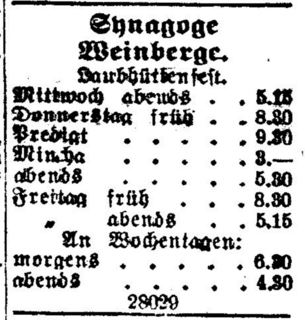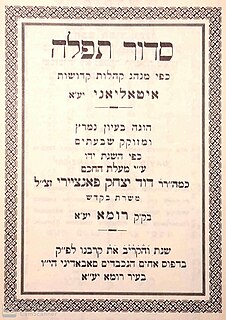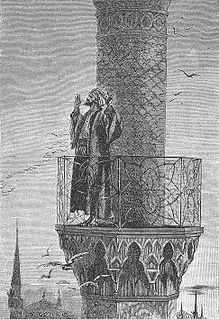See also
- Maarif (disambiguation)
- Ma'rib, a city in Yemen
Maariv is a Jewish prayer service held in the evening or night. Maariv may also refer to:

Jewish prayer is the prayer recitation that forms part of the observance of Rabbinic Judaism. These prayers, often with instructions and commentary, are found in the Siddur, the traditional Jewish prayer book.

Shema Yisrael is a Jewish prayer that serves as a centerpiece of the morning and evening Jewish prayer services. Its first verse encapsulates the monotheistic essence of Judaism: "Hear, O Israel: the LORD is our God, the LORD is one", found in Deuteronomy 6:4.
Ahava rabbah is a prayer and blessing that is recited by followers of Ashkenazi Judaism during Shacharit immediately prior to the Shema, the "Hear O Israel..." prayer. Sephardi Jews, as well as those whose custom is Nusach Sepharad, begin this blessing with the words "Ahavat Olam" instead of Ahava rabbah; which is not to be confused with the shorter blessing of Ahavat Olam recited by both Sefardim and Ashkenazim during Maariv.

Berakhot is the first tractate of Seder Zeraim of the Mishnah and of the Talmud. The tractate discusses the rules of prayers, particularly the Shema and the Amidah, and blessings for various circumstances.

Zmanim are specific times of the day in Jewish law.
Kedushah (Holiness) is the name of several prayers recited during Jewish prayer services. They have in common the recitation of two Biblical verses - Isaiah 6:3 and Ezekiel 3:12. These verses come from prophetic visions in which angels sing the verses, "Holy, Holy, Holy" as praises to God.
Keri is a Hebrew term which literally means "happenstance", "frivolity" or "contrariness" and has come to mean seminal emission. The term is generally used in Jewish law to refer specifically to the regulations and rituals concerning the emission of semen, whether by nocturnal emission, or by sexual activity. A man is said to be a ba'al keri after he has ejaculated without yet completing the associated ritual cleansing requirements.
The term Motza'ei Shabbat in Judaism refers to the time in the evening immediately following Shabbat, that is Saturday night. It is a time when, following one's declaration of the intention to end Shabbat, it is permissible to resume weekday activities that are prohibited on Shabbat. This may occur no earlier than when three "small" stars appear in the sky. There are varying opinions as to how much time elapses following sunset until this occurs. This difference of opinions results in different ways to predetermine the fixed time when the Shabbat will end on a given Saturday night. The time varies, depending on one's geographic location and the time of year.

Maariv or Maʿariv, also known as Arvit, is a Jewish prayer service held in the evening or night. It consists primarily of the evening Shema and Amidah.
Baruch Hashem L'Olam may refer to the following prayers:
HaMaariv Aravim, or simply Maariv Aravim, is the first blessing before the Shema and generally the opening prayer during Maariv. It is considered to be the parallel prayer to Yotzer ohr, which is recited in the same place at Shacharit. Just as Yotzer Ohr speaks of the coming of light, HaMaariv Aravim speaks of the coming of darkness.
Ahavat Olam is the second prayer that is recited during Maariv. It is the parallel blessing to Ahava Rabbah that is recited during Shacharit, and likewise, is an expression to God for the gift of the Torah.
Emet V'Emunah is the paragraph that is recited immediately following Shema during Maariv. Its recitation fulfills the obligation to recall the Exodus from Egypt during the evening.
Barechu is a part of the Jewish prayer service, functioning as a call to prayer. It is recited before the blessings over the Shema at Shacharit and Maariv, and before each aliyah in the Torah reading. Some congregations also recite it toward the end of both Shacharit and Maariv, for the benefit of those who arrived late to the service.
Shema may refer to:
Evening service may refer to:

Italian Nusach, also known as Minhag Italiani, Minhag B'nei Romì, Minhag Lo'ez or Minhag HaLo'azim, is the ancient prayer rite of the indigenous Jews on the Italian peninsula who are not of Ashkenazi or Sephardic origin.

A call to prayer is a summons for participants of a faith to attend a group worship, or to begin required set of prayers. The call is one of the earliest forms of telecommunication, communicating to people across great distances. All religions have a form of prayer, and many major religions have a form of the call to prayer.